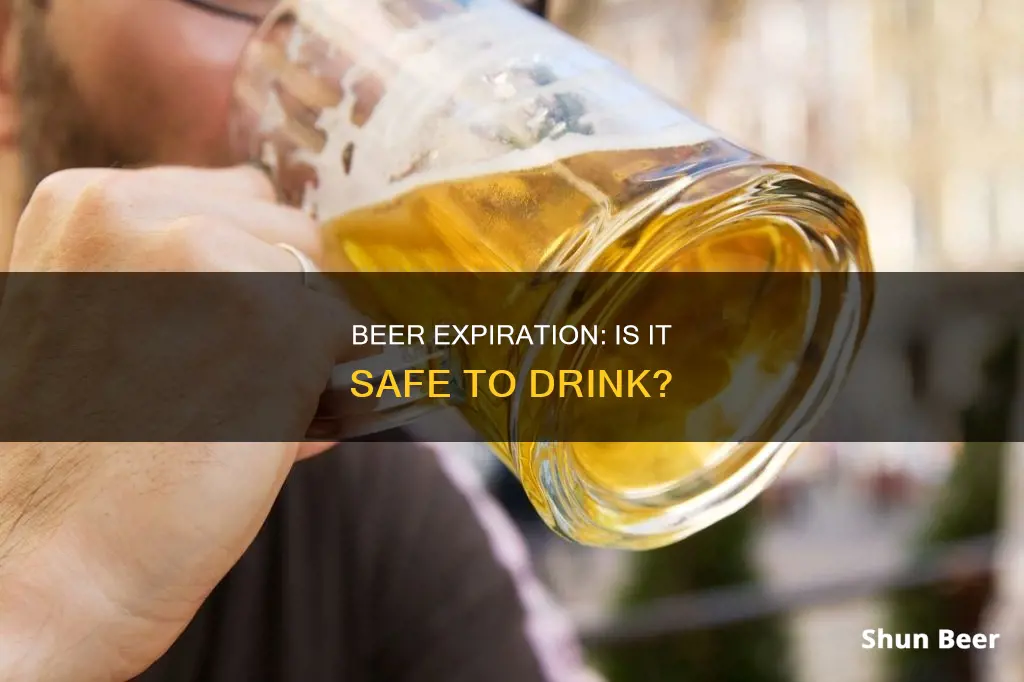
Beer is a beloved beverage for many, but what happens if you drink it past its expiration date? Unlike wine, which can be saved for a special occasion, almost every type of beer only gets worse as time goes on. Beer doesn't expire in the traditional sense, but several factors can cause it to spoil or skunk, including light, oxygen, heat, and time. So, can you drink beer that has expired? The short answer is yes, drinking expired beer is unlikely to make you sick, but it might not taste very good.
| Characteristics | Values |
|---|---|
| Can you drink expired beer? | Yes, but it may not taste good. |
| Will expired beer make you sick? | No, it is generally safe to drink. |
| What affects the taste of expired beer? | Type of beer, storage conditions, light exposure, temperature, etc. |
| How long does beer last? | Beer lasts about 5-9 months beyond the expiration date at room temperature. In a refrigerator, unopened beer can last up to 2-3 years, while opened beer has a shelf life of about a day. |
| Does the type of beer affect its shelf life? | Yes, stronger beers like stouts and porters tend to last longer than lighter beers like lagers and pilsners. |
| How does light exposure affect beer's shelf life? | Light exposure, especially UV rays, can cause beer to develop a skunky taste and odor, especially in clear or green bottles. Brown bottles and cans offer better protection. |
What You'll Learn

Beer doesn't expire in the same way that other foods do
This is because, unlike other foods, there is no pathogenic bacterial growth in beer. The alcohol content in beer and the presence of hops, which have antimicrobial characteristics, prevent pathogens from growing.
However, beer can go bad in other ways. At room temperature, beer lasts about 5 to 9 months beyond the expiration date listed on the label. In a refrigerator, unopened beer can last up to two or three years, while opened beer has a shelf life of about a day. Beer is also susceptible to lightstrike, a chemical reaction triggered by ultraviolet light that comes in contact with certain hop compounds, which results in a compound that smells almost identical to a skunk.
Different types of beers have different shelf lives. Stronger beers, such as stouts, porters, and high-alcohol content beers, tend to last longer than lighter beers like lagers and pilsners. Additionally, the packaging and storage conditions can also affect the shelf life of beer. For example, clear or green bottles are more susceptible to light exposure, which can cause the beer to become "skunky" and deteriorate the flavors more quickly.
Beer and Penicillin: A Dangerous Mix?
You may want to see also

It won't make you sick, but it might taste bad
Beer is unlikely to make you sick, even if it's expired. However, it's important to note that its taste and quality will be significantly affected, and it may not be a pleasant drinking experience.
Beer doesn't typically "expire" in the same way that other foods and beverages do. The alcohol and hops in beer have antimicrobial properties that prevent pathogenic bacterial growth, which is what makes beer safe to consume even past its expiration date. However, this doesn't mean that beer doesn't undergo changes over time.
The shelf life of beer depends on various factors, including the type of beer, packaging, and storage conditions. Lighter beers, such as lagers and pilsners, are best enjoyed fresh, as they are more susceptible to oxidation and flavour loss. On the other hand, bottle-conditioned beers with a higher ABV (9% or higher) tend to have longer shelf lives and can even improve with age.
Proper storage is crucial to maintaining the quality of beer. Heat, light, oxygen, and time are the main culprits of spoiled beer. High temperatures and exposure to sunlight can accelerate the deterioration of beer, leading to unpleasant flavours and aromas. Therefore, it is recommended to store beer in a cool, dark place, such as a refrigerator, to slow down the oxidation process and preserve its freshness.
While drinking expired beer won't make you sick, it might not be a pleasant sensory experience. The flavours and aromas of the beer may have diminished or transformed into unappealing ones. The beer might taste "skunky" or develop acidic flavours, such as stewed tomatoes, with a cardboard-like aftertaste.
In conclusion, while it's safe to drink beer past its expiration date, the taste and quality will likely suffer. To ensure the best drinking experience, it's always recommended to consume beer as fresh as possible, especially for hop-heavy styles like IPAs, and to store beer properly to maximise its shelf life.
The Cost of Beer vs Mixed Drinks: Which is Cheaper?
You may want to see also

Different beers have different shelf lives
Beer does expire, but it doesn't become unsafe to consume. The worst thing that will happen is that the beer will taste bad. However, different beers have different shelf lives.
Firstly, it's important to note that the packaging of the beer will affect its shelf life. Beer in clear or green bottles will expire much faster than beer in brown bottles or cans. This is because UV rays can cause beer to develop a skunky odour and taste, and brown glass offers the best protection against UV rays, while clear or green glass provides almost no protection.
Secondly, the type of beer will also affect its shelf life. Stronger beers, such as stouts, porters, and high-alcohol content beers, tend to last longer than lighter beers like lagers and pilsners. Hoppy beers, like IPAs, are best consumed fresh to enjoy their full flavour and aroma.
Beers with high alcohol content, such as barley wines and imperial stouts, are sometimes brewed with aging in mind. These beers can be safely stored for a couple of years and can develop new and interesting flavours over time.
On the other hand, pilsners are best enjoyed as fresh as possible, as oxidation will quickly and dramatically affect their light, floral quality. Lagers and wheat beers will start to lose their flavour and aromatics after about three months.
IPAs are also best enjoyed fresh, as the volatile aromas from hops will start to dissipate after a few months. However, if an IPA is purchased within two days of its canning, letting it sit in the fridge for about a week will allow the harshness to mellow out.
In summary, while beer doesn't pose a health risk if consumed past its expiration date, different beers have different optimal consumption times. The type of beer and the packaging it comes in will affect its shelf life, and beer enthusiasts should pay attention to these factors to ensure they're getting the best possible experience from their beverage of choice.
Beer and Dental Fillings: What You Need to Know
You may want to see also

Beer is best stored in a cool, dark place
When it comes to storing beer, there are a few key factors that will help keep your brew in optimal condition. Firstly, let's talk temperature. Beer is best kept in a cool environment, as heat can cause it to go stale or spoil more quickly. Aim to store your beer at a consistent, cool temperature, avoiding extreme heat or fluctuations. This will help maintain its freshness and slow down any degradation in flavour.
Next up is light exposure. Beer is sensitive to light, particularly UV rays, which can cause a chemical reaction resulting in an unpleasant skunky odour and taste. To prevent this, keep your beer away from direct sunlight and sources of UV light. Store it in a dark place, such as a basement, pantry, or wine cellar. If you're using a glass bottle, opt for darker-coloured glass, such as brown or amber, which offers better protection against UV rays. Alternatively, cans are an excellent option as they completely block out light, providing optimal protection for your beer.
In addition to temperature and light control, consistency is key. Avoid exposing your beer to frequent temperature and light fluctuations, as this can negatively impact its flavour. Keep your beer in a stable, controlled environment, and you'll maximise its shelf life.
By following these simple storage guidelines, you'll be able to enjoy your beer at its freshest and fullest potential. So, the next time you stock up on your favourite brew, remember to store it in a cool, dark place, and you'll be rewarded with a delicious, well-preserved beverage.
Beer and Robaxin: Safe After Six Hours?
You may want to see also

Opened beer has a shelf life of about a day
Oxidation is generally considered to negatively affect beer. No matter how well a beer is canned or bottled, there will always be a small amount of oxygen in each vessel. For most light styles, such as pilsners, oxidation sets in rapidly. Bright, malty flavours are fragile and can quickly turn into acidic flavours of stewed tomatoes with a cardboard-like aftertaste.
Beer is susceptible to the four main culprits of spoiled or "skunked" beer: light, oxygen, heat, and time. Hops are sensitive to UV radiation from the sun, which is why most beer bottles are tinted brown to protect the beer from light. Even if exposed to sunlight for under an hour, beer will undergo a chemical reaction that produces 3-methyl crotyl mercaptan, a compound that gives off a distinct skunky flavour.
To keep beer from diminishing in quality, it is recommended to check the expiration date (if it's on the packaging). If you aren't planning on drinking it right away, it's best to store it in the fridge until you're ready to drink it. If you don't have space, keep it in the coolest part of your house, like a cool basement or cellar. Finally, try to make sure your storage area is as dark as possible.
Non-Alcoholic Beer and AA: What's the Verdict?
You may want to see also
Frequently asked questions
No, drinking expired beer will not make you sick. Beer doesn't expire in the same way that other foods and drinks do. The worst thing that will happen is that it will taste bad.
At room temperature, beer lasts about 5 to 9 months beyond its expiration date. In a refrigerator, unopened beer can last up to an additional two or three years. Opened beer has a shelf life of about a day, regardless of its expiration date.
You can tell if beer has expired by looking at its colour, smell, taste, foam density, and overall appearance. If the beer is only slightly past its expiration date, it may be hard to tell.







